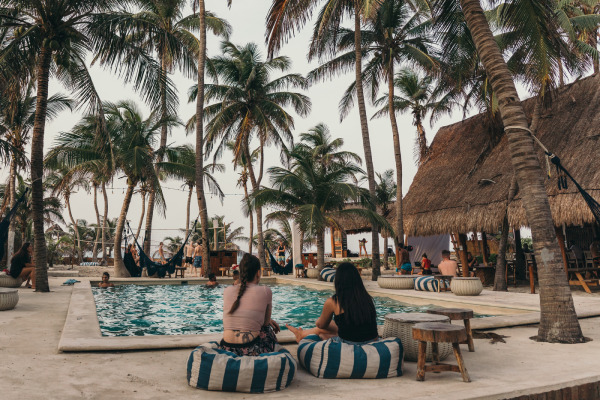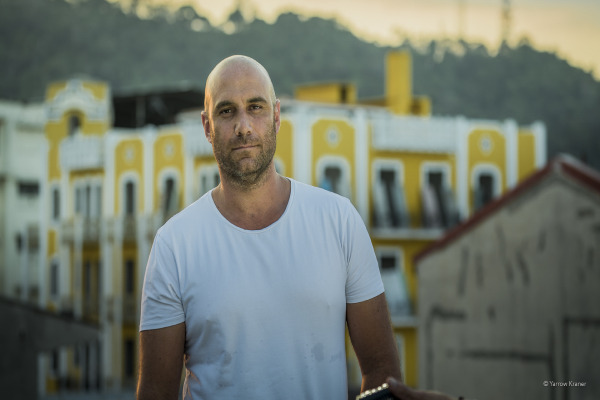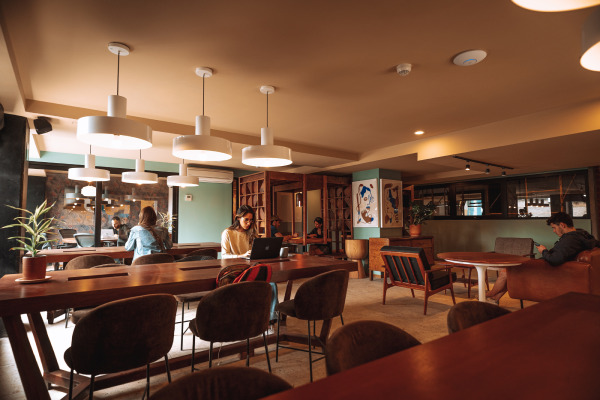Convert tired, underperforming hotels into something fresh, a little left of center in great locations that increase revenue on average 2.4 times without spending more than pre-opening costs, which are no more than 10% of the upfront investment. Sounds easy, right? And what a huge opportunity considering all of the struggling, neglected hotels around the world, especially those not affiliated with brands. Big opportunity, yes? Easy? Not so much, says Selina Co-Founder Rafael Museri, who very confidently told HOTELS he has a leg up on any competitor because his brain trust has created its own technology to identify the best opportunities and created a concept that caters so well to millennials and Gen Z travelers, who make up about US$350 billion of the travel spend per year.
While it is not exactly clear how it works, Museri said Selina’s proprietary technology identifies the most distressed and underutilized assets in a specific marketplace. His team can then go directly to those landlords, negotiate leases (a majority range from 15-20 years) and close them. Because of the technology, about 80% of deals are executed off market without brokers and generate a 20% discount to market lease prices, according to Museri. Even better for Selina investors, about 90% of the funding to convert properties comes from local real estate partners who take most of the risk. Selina remains asset light.

“We believe that once a deal goes to bid and you have five traditional, big hospitality players bidding the price is going up and up,” Museri said. “I’ve seen that with my own eyes – how every bid increases the price. And I didn’t feel that I wanted to compete in this specific area.”
By January of 2022, the Selina way had generated 144 open or secured properties across five continents (90 of which are fully operating). In December 2021 alone, Selina opened six properties and six additional locations soft-launched in Australia, Brazil, Panama and more. This represents the highest-volume month of openings in the company’s history, at a pace of three per week. In addition, Selina had a strong 4Q21 and says it expects to exceed its 2021 revenue forecast of US$93 million.
Now, to supercharge the growth and take aim at global domination in the lifestyle space, in early December Selina announced it was going public via a SPAC through a merger with BOA Acquisition Corp. The combined company is expected to have an equity value of approximately US$1.2 billion and the deal is expected to close in the first half of this year.
With the pending SPAC, the business combination provides US$285 million in gross cash proceeds, including US$70 million in capital commitments comprising PIPE investments from institutional investors, including South Light Capital (an affiliate of DigitalBridge), MORE Investment House and Sir Ronald Cohen, alongside PIPE and backstop commitments from BOA’s sponsor and founder-led shareholders.
Proceeds will allow Selina to fuel international expansion, invest in proprietary technology, and attract and retain high-quality talent.
Selina expects to be EBITDA positive by Q1 2023 and generate approximately US$1.2 billion in revenue by 2025.

“Capitalizing the company is going to allow Selina to not only open individual assets, but explore portfolio transactions, and potentially strategic M&A that would expand the footprint of this brand,” said BOA CEO Ben Friedman. “And we firmly believe that this can, and will, be one of the largest hospitality companies and lifestyle and experiential brands globally. Our hope is to compete with all facets of the hospitality space just about everywhere in the world.”
Further elaborating on Selina’s growth, Museri said the brand has always relied on local people to tell them where they should build next based on where they want to travel. “That’s how we build the roadmap,” he said. “So, when COVID hit and people were traveling in their own countries, Selina became one of the most attractive platforms for them. Overall, for us, COVID just made the brand and our business model even more relevant than ever. And our forecast for 2022 is we’re definitely going to more than double our revenue.”
Friedman said that to see a company perform at such a high level and to be able to take advantage of this shift in hospitality from traditional to more lifestyle and experiential, and to be targeting a subset and a demographic that was underserved in the broader space made this an attractive business combination. “We’re incredibly encouraged by the performance we’ve seen in 2021 – from the investment we’ve seen and the customer engagement we’ve seen across the board,” Friedman said. “We expect that to continue. As we start to see COVID dissipate and restrictions on travel dissipate, 2022 should be an incredibly exciting year for Selina.”

Museri added that Selina, which has a conversion cost ranging anywhere between US$20,000 to US$40,000 per key, which includes everything, is opening new units almost every two weeks and just opened for the first time in Southeast Asia. “We have started signing and building in new, exciting countries such as Morocco, Thailand and Spain,” he said. “We kept expanding in 2021 in countries that did great during COVID. For example, when we realize that countries like Portugal, Israel, Mexico, and countries in Central America were doing great during COVID, we just shifted our technology towards those countries to identify the best asset for us. Quickly, we grew within the same year in those countries. That level of flexibility that exists in Selina today is very difficult to find in the hotel industry – the ability to realize in February 2021 there’s something very interesting happening in domestic travel in Mexico, Costa Rica and Portugal, for example, and within two months nail another five or six new locations in those countries, and three months after to open them and generate great revenue, profitability and deliver a great experience for the brand. That’s what we did in 2021. We listened to the customers, took quick decisions, shifted technologies and moved.”
Selina’s juju
So, what makes Selina so special? Museri and investors think it is their proprietary system and naturally the concept, which focuses on hosting remote workers and digital nomads in a play, stay, work ecosystem. Data from Upwork suggests that by 2028, 73% of business are expected to utilize remote workers.
Next comes partnerships with local artisans, who embed a local cultural influence, to create destinations that combine the comfort and style of a boutique hotel with coworking facilities and the social experiences of a retreat or festival, driving significant increases in revenue compared to a property’s prior operations. That local connection drive 61% of F&B revenue and generates strong social media engagement.
Within about 120 days of a signed deal, Museri said, conversions are completed. They increase bed density (many rooms are not private), new revenue streams through co-working, F&B products and newly activated programming and content (40% of revenue is generated from non-room products). About half the revenue comes from F&B and direct bookings are closing in on 50%, which significantly reduces customer acquisition costs compared to its comp set.
Selina’s owned and flexible PMS can create and sell alternative products like subscriptions, co-working packages and tokens for its digital nomad target guests. Its locations can be fully cashless with remotely monitored utility costs and an ability to predict maintenance issues from headquarters. Its platform can also exchange unsold rooms to local content providers like musicians, artists and yoga instructors, drastically reducing programming costs.
Museri said Selina is experiencing demand greater than pre-COVID-19 levels and witnessing 13% above pre-COVID-19 same-store net advance bookings levels. When opening new properties, Selina’s average occupancy 60 days after opening has been sitting at 56%, which they believe is 31% higher relative to comparable hotels in their markets.
Additional revenue is coming in from Selina’s Nomad Passport subscription model that allows guests to stay at any property for as long as desired with full amenities. Since its launch in September 2020, more than 2,600 passports have been sold at an US$800 per month subscription price and a 3% acquisition cost per new subscriber.

Citing an example of successful conversions, Museri pointed to two destinations opened last year outside the traditional Miami Beach hotel scene. It leased at a 50% discount to Miami Beach, while generating similar RevPAR. Selina created destinations powered by local F&B, content and programming that they say took RevPAR to US$118 from US$52 and F&B revenue to US$83 per day/per room from zero, and overall generated a 16.5% unit-level EBITDA margin.
What seems to matter more than anything, said Museri, is the brand’s relevancy and what Selina calls its “destination strategy.” “The key is, if you relevant to this generation, they enjoy being a part of this movement… The team is serving their friends in their own community… They feel attached to it and the brand becomes part of the community.”
Underscoring the importance of the community message and mindset, Museri said he spends a lot of his time brainstorming with the local key influencers. “We call them ‘the experience board,’” he said. “They’re not from hospitality – they’re customers and they’re defining for us what they need. The focus of this company is to listen to the community and build a product for them. This will always be the number one focus.”
It is this focus that Museri said allows Selina to gather much more revenue per square meter compared to many of its competitors. “It’s due to the fact that you’re more of a lifestyle platform, and not just a hotel.”

